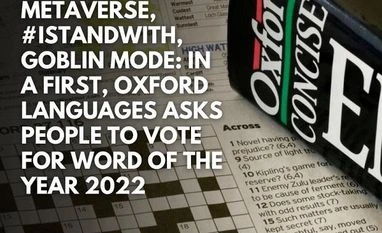How do you sum up an entire year in a single word? Well, the Oxford University Press (OUP) believes it can be done. After all, it has been doing so every year since 2004 through its “Word of the Year”. It did make an exception, though, in 2020 when it noted that the pandemic-riddled year “could not be summed up in one single Word of the Year”.
So far, OUP has been going solo in deciding the word of the year. This time, however, in a first, people of the world will vote to choose from OUP’s shortlist of three words for this year: “metaverse”, “#Istandwith”, and “Goblin Mode” (see box).
Now the question is: How did OUP arrive at these three finalists? What’s the process the publisher follows to give the world the “Word of the Year”?
Every year, the candidates for the “word of the year” are drawn from nearly 150 million words of current English from web-based publications each month. The organisation’s lexicographers then identify new and emerging words, while also examining the shifts in how more established words are being used.
The process is often year-long, and dictionary editors keep flagging notable words for consideration throughout the year.
Traditionally, since OUP began the process in 2004, the Oxford Languages team decides the final word based on all the data thus gathered.
This year, in a shift from tradition, the decision to choose the final “word of the year” rests with the public.
In a statement, the OUP said, “2022 has been a year defined by opening back up. However, although we have finally been able to physically reunite and come together again, our world somehow feels more divided than ever. In recognition of this shift, we wanted to open the final step of our Word of the Year selection process to the true arbiters of language: people around the world.”
The use of a popular vote to choose Oxford’s word of the year will provide a clearer indication of which word resonates with the global English speaker and, therefore, carries greater linguistic and cultural currency.
OUP usually announces a UK Word of the Year as well as its US counterpart. Sometimes these are the same word. Often, they are not.
Moreover, the “word of the year” need not have been coined within the past twelve months, but it does need to have become prominent or notable during that time.
There is also no guarantee that the “word of the year” will be included in any Oxford dictionary.
Last year, after a gap year, the world-renowned publishers of the Oxford English Dictionary were back, this time with the word “vax” emerging as the defining English term for the year amidst global debates on Covid-19 vaccinations.
Hindi word of the year
The OUP has also, in the past, come up with the “word of the year” in Hindi, with “Aatmanirbharta” (self-reliance) and “Samvidhaan” (constitution) becoming finalised words for 2020 and 2019, respectively. These were preceded by “Shakti” (power) in 2018, and “Aadhaar” (essence/foundation) in 2017.
Other lists
The OUP is only one of the several publishers of English-language dictionaries — including Cambridge, Dictionary.com, and Merriam-Webster — to attempt the annual lexicographic feat of summing up the year in a single word. But it is not the oldest.
In English, the honour goes to the American Dialect Society (ADS). Its list has been ongoing since 1990, and is the only one that is announced after the end of the calendar year, determined by a vote of independent linguists. The other lists are released closer to the end of the year.
The ADS list has given us such classics as “Y2K,” “metrosexual,” “hashtag” and, most famously, “bushlips” — derived from President George H W Bush's 1988 “Read my lips: no new taxes” broken promise, and a synonym for falsehoods or lies. The ADS also has lists of the “most outrageous”, “most euphemistic”, and “most unnecessary” words.
Here’s a sample of those words for 2015, the last year ADS published these lists:
Most unnecessary: manbun, a man's hairstyle pulled up in a bun.
Most euphemistic: Netflix and chill, implying sexual come-on masked as a suggestion to watch Netflix and relax.
Most outrageous: let’s just say it’s a word outside of Business Standard’s printing policy.
In other languages, the German tradition, Wort des Jahres, was started in 1971 and is arguably the oldest known example of such lists across the world. The list famously inducted “Holocaust” in 1979, in the wake of an increased public interest in the study of Nazi war crimes.
2022’s finalists
Metaverse
- Usage quadrupled in October 2022 since the same month last year
- Tech giants and start-ups alike are flocking to the metaverse
- The idea of accessing virtual digital worlds has also caught the attention of netizens across the world
#IStandWith
- Found frequent use on social media to align your views to a cause or person, from the war in Ukraine to the Johnny Depp vs Amber Heard court proceeding
- The polling reaction to the “word” will also highlight how and whether people accept the idea of a hashtag as a word in itself
Goblin Mode
- A neologism for rejecting societal expectations and living in an unkempt, hedonistic manner without regard to self-image
- Dates back to 2009, but gained currency in the rejection of returning ‘back to normal’ after the pandemic
Unlock 30+ premium stories daily hand-picked by our editors, across devices on browser and app.
Pick your 5 favourite companies, get a daily email with all news updates on them.
Full access to our intuitive epaper - clip, save, share articles from any device; newspaper archives from 2006.
Preferential invites to Business Standard events.
Curated newsletters on markets, personal finance, policy & politics, start-ups, technology, and more.
)